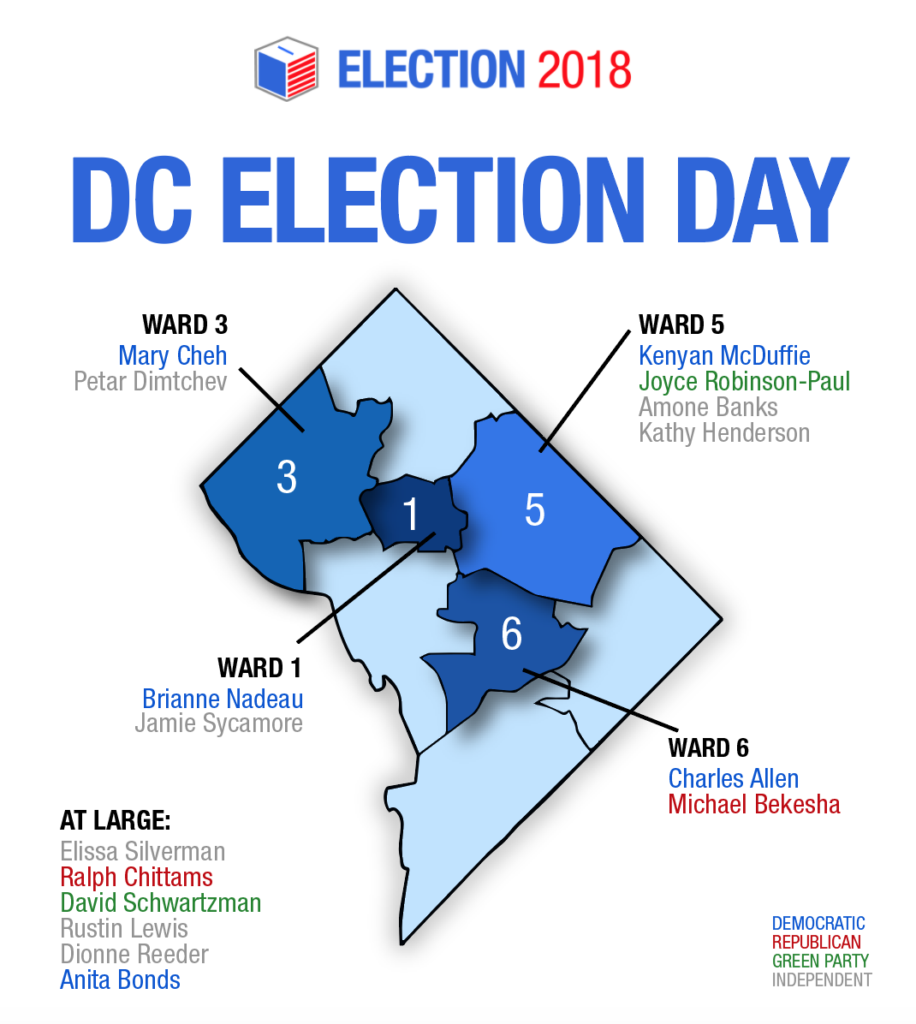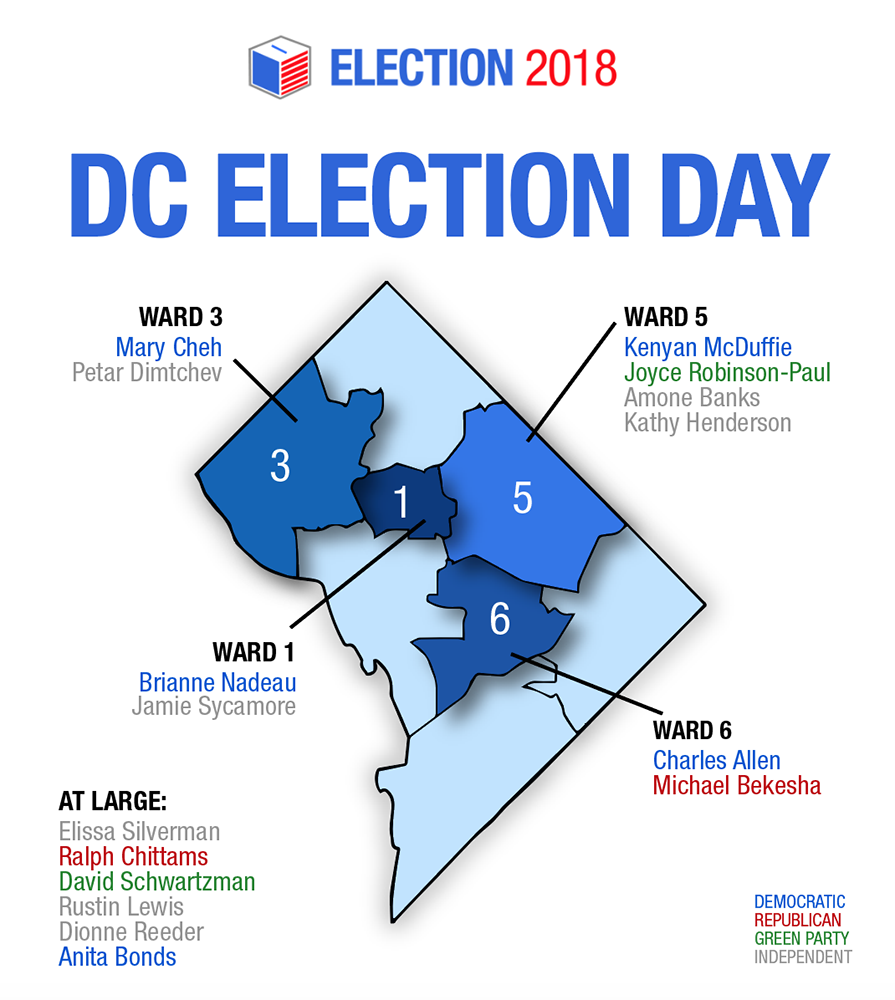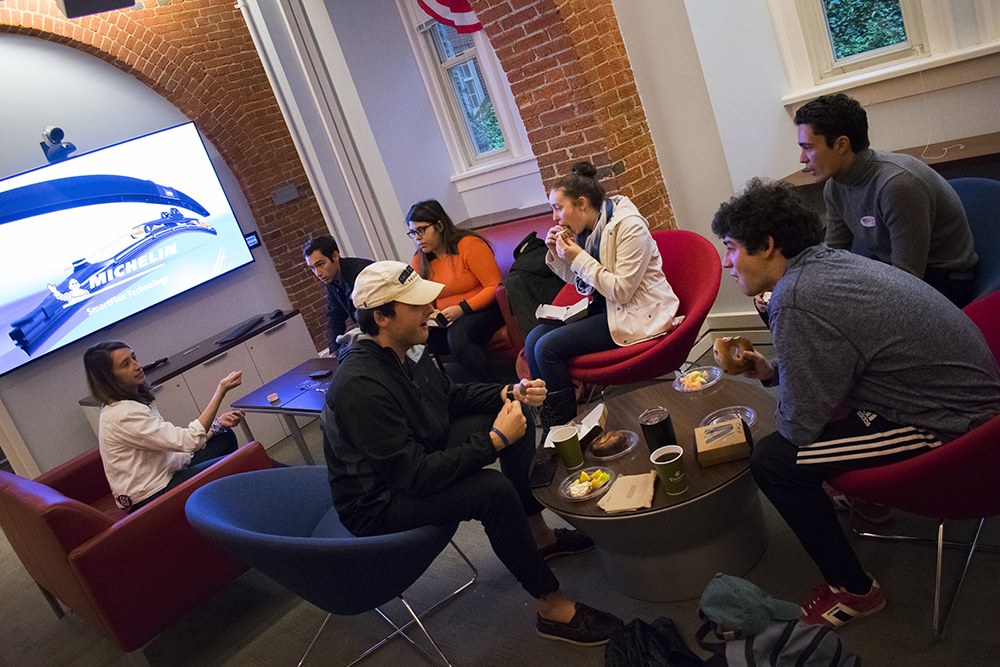
Updates will be posted here throughout the day. Follow us on Facebook, Twitter (@thehoya) and Instagram (@the_hoya) for more coverage.
1:30 a.m.
Del. Stacey Plaskett (SFS ’88) won her uncontested re-election bid for delegate to the U.S. House from the U.S. Virgin Islands' at-large congressional district, according to the Election System of the Virgin Islands. #midtermscoverage
— The Hoya (@thehoya) November 7, 2018
12:56 a.m.
Democrat Lori Trahan (SFS ’95) has been elected to the U.S. House to represent Massachusetts’ 3rd District, according to The New York Times. #midtermscoverage
— The Hoya (@thehoya) November 7, 2018
12:46 a.m.
Incumbent Rep. Scott Perry (R-Pa.) has defeated Democratic challenger George Scott (SFS ’84) in Pennsylvania's 10th District, according to The New York Times. #midtermscoverage
— The Hoya (@thehoya) November 7, 2018
12:26 a.m.
Jessica Sutter has been elected to the D.C. Board of Education to represent Ward 6, according to the D.C. Board of Elections. #midtermscoverage
— The Hoya (@thehoya) November 7, 2018
12:22 a.m.
Zachary Parker has been elected to the D.C. Board of Education to represent Ward 5, according to the D.C. Board of Elections. #midtermscoverage
— The Hoya (@thehoya) November 7, 2018
12:20 a.m.
Incumbent Ruth Wattenberg has been re-elected to the D.C. Board of Education to represent Ward 3, according to the D.C. Board of Elections. #midtermscoverage
— The Hoya (@thehoya) November 7, 2018
12:14 a.m.
Georgetown professor Emily Gasoi has been elected to the D.C. Board of Education to represent Ward 1, according to the D.C. Board of Elections. #midtermscoverage
— The Hoya (@thehoya) November 7, 2018
12:05 a.m.
Councilmember Charles Allen (D-Ward 6) has been re-elected to the D.C. Council with 89.4 percent of the vote, according to The Washington Post. #midtermscoverage
— The Hoya (@thehoya) November 7, 2018
12:04 a.m.
Councilmember Kenyan McDuffie (D-Ward 5) has been re-elected to the D.C. Council with 80.7 percent of the vote, according to The Washington Post. #midtermscoverage
— The Hoya (@thehoya) November 7, 2018
11:59 p.m.
Councilmember Mary Cheh (D-Ward 3) has been re-elected to the D.C. Council with 74.3 percent of the vote, according to The Washington Post. #midtermscoverage
— The Hoya (@thehoya) November 7, 2018
11:57 p.m.
Councilmember Brianne Nadeau (D-Ward 1) has been re-elected to the D.C. Council with 78.9 percent of the vote, according to The Washington Post. #midtermscoverage
— The Hoya (@thehoya) November 7, 2018
11:46 p.m.
AJ Williamson (COL ’21), vice president of the Georgetown chapter of the ACLU, said though many races turned out as expected, the outcomes of the races that have not yet been called are important in determining the state of the federal judiciary.
“The path to get there was a little wonky, but in the end we’re actually pretty much where we expected to be at the start of the night,” Williamson wrote in a text. “Depending on some of the outcomes of the remaining races, we might be a little more worried than we were before about the state of the federal judiciary, but it still remains to be seen.”
11:45 p.m.
GUCR President Jake Lyons (COL ’20) said the results are as he expected, and he hopes that Congress will work to create bipartisan cooperation.
“Honestly this has been my expectations, the numbers and states were always in republicans favor and I’m very happy we retained control of the senate,” Lyons wrote in a text. “I would hope that the house will hopefully work in the next Congress to form bipartisan, principled comprises that advance the best interest of the American people with the administration – and I fully expect that they do so.”
11:38 p.m.
Rep. Pramila Jayapal (D-Wash.) (CAS ’86) is projected to win re-election in Washington’s 7th District, according to the Associated Press. #midtermscoverage
— The Hoya (@thehoya) November 7, 2018
11:34 p.m.
Republican candidate Jim Maxwell (CAS ’71) lost his bid for a U.S. House seat in New York’s 25th District with 41.4 percent of the vote, according to the Associated Press. #midtermscoverage
— The Hoya (@thehoya) November 7, 2018
11:30 p.m.
“It’s been really amazing to see all the women that have won seats,” said GUCD Chair Maria Cornell (SFS ’20), citing a new class of women of color who will be entering the U.S. House. “Representation matters. It’s not everything, but it matters so much, and being able to change the demographics of the United States Congress is really historic and meaningful.”
Cornell said the Democrats’ performance stood out as strong when considered in the face of structural disadvantages.
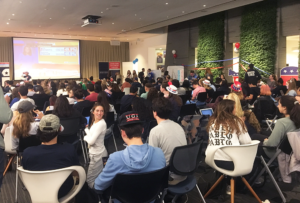
“It’s incredible to see with such rampant voter suppression and just the extent of control that the GOP has had over local and state governments and how they’ve been able to write election laws and gerrymander districts,” Cornell said. “To see us taking so many seats under those conditions and being so close to many other districts that you wouldn’t have even thought of — that’s beyond anything I would have expected for sure.”
Cornell also spoke to the tension among many Democrats in the room for the first few hours as discouraging results came in from Florida.
“The low-key PTSD when all the results for Republicans were coming in the beginning was scary,” Cornell said. “But obviously that turned around as the night’s gone on.”
11:24 p.m.
Rep. Pramila Jayapal (D-Wash.) (CAS ’86) is winning her re-election bid in Washington’s 7th District with 83.4 percent of the vote after 76 percent of the vote has been counted, according to the Associated Press. #midtermscoverage
— The Hoya (@thehoya) November 7, 2018
11:18 p.m.
Democratic candidate Will Haskell (COL ’18) has won his race for the Connecticut State Senate in the 26th District, according to local publications. #midtermscoverage
— The Hoya (@thehoya) November 7, 2018
11:16 p.m
Joseph Gomez (SFS ’19), resident director of La Casa Latina, was excited about the Democrats winning some seats in the House but expressed disappointment regarding the voting experiences for some historically marginalized communities.
“While I’m disappointed about the way the senate race in Texas turned out and the way Florida turned out in general, Democrats have flipped some key house seats which, all though expected, is still nice to see,” Gomez wrote in an email to The Hoya. “It has been disheartening though to hear all of the horror stories coming out of predominantly low-income and POC precincts. Voter suppression is still an issue in 2018, and until we adopt automatic voter registration and repeal voter ID laws, I hesitate calling our election as free and fair.”
11:12 p.m.
Democratic challenger and Georgetown University adjunct professor Lauren Underwood won the election for the U.S. House seat in Illinois’ 14th District, according to the Associated Press. #midtermscoverage
— The Hoya (@thehoya) November 7, 2018
11:07 p.m.
D.C. Shadow Senator Michael Brown (D) has won re-election with 84.4 percent of the vote, according to The Washington Post. #midtermscoverage
— The Hoya (@thehoya) November 7, 2018
11:03 p.m.
Rep. Debbie Dingell (D-Mich.) (SFS ’75, GRD ’98) has won re-election in Michigan’s 12th District, according to the Associated Press. #midtermscoverage
— The Hoya (@thehoya) November 7, 2018
11 p.m.
CNN reported that Democrats are projected to control the House, garnering significant applause among the audience in the Healey Family Student Center.
10:57 p.m.
Rep. Henry Cuellar (D-Texas) (SFS ’78) has won re-election in Texas’ 28th District, according to The New York Times. #midtermscoverage
— The Hoya (@thehoya) November 7, 2018
10:45 p.m.
Michael Lundgren (SFS ’22) said the night had gone as he expected with Democrats taking the House and Republicans holding the Senate — an outcome he was wishing for.
“I’m not a Trump supporter, so I was hoping Democrats would take the House to provide an extra check on the president’s power,” Lundgren said. “But I was hoping Republicans would hold the Senate.”
10:41 p.m.
Councilmembers Anita Bonds (D-At Large) and Elissa Silverman (I-At Large) have been re-elected to the D.C. Council, according to The Washington Post. #midtermscoverage
— The Hoya (@thehoya) November 7, 2018
10:37 p.m.
Gov. Larry Hogan (R-Md.) has been re-elected for a second term as governor, defeating Democratic challenger Ben Jealous, according to the Associated Press. #midtermscoverage
— The Hoya (@thehoya) November 7, 2018
10:25 p.m.
GUCR President Jake Lyons (COL ’20) said he had expected the race in Arizona to be tight.
“Big shoes to fill there with Senator [Jeff] Flake now leaving, and I think we may be seeing one of the closer races of this cycle unfolding there,” Lyons wrote in a text.
Lyons also said he was excited to see former Massachusetts Governor Mitt Romney (R-Utah) be elected to the U.S. Senate.
“On a separate note I’m ecstatic to see Mitt Romney joining the senate (I know it’s been expected) but I’ve always been a fan of his and look forward to seeing what he will do in that chamber of our congress,” Lyons wrote.
10:20 p.m.
While many Democrats expressed optimism for the party’s chances of taking control of the House, they were disappointed by the extent of the “blue wave” they had been anticipating.
“I think it’s a good night for Democrats, but I think we could have done better,” Gonzalo Nuñez (SFS ’20) said.
Many Democrats also said they took lessons from 2016 and tried to reserve their hope.
“I don’t have many expectations, because I was here two years ago,” Noah Joseph (COL ’20) said.
10:10 p.m.
Maria Cornell (SFS ’20), chair of GUCD, said “there was a dip” in Democratic enthusiasm after the initial Florida results until “the Democratic gains came in” and their spirits were buoyed.
10:05 p.m.
H*yas for Choice President Angela Maske (NHS ’19) emphasized the role that governors races can play in implementing policy in health care and reproductive rights at the HFC Watch Party.
“But I think also, especially when it comes to health care and reproductive rights, governors races are extremely important, because a lot of whether, like for example, certain anti-choice legislation passes, that lies basically in the hands, ultimately, of the governor,” Maske said. “So I think it’s important to also realize that a lot of where the key battles on reproductive health care and reproductive justice take place is at the state level, and so we can’t ignore the governors races at all in this, so that’s something we’ll be watching for as well.”
10 p.m.
Rep. Filemon Vela (D-Texas) (CAS ’85) has won re-election for Texas’ 34th District, according to the Associated Press. #midtermscoverage
— The Hoya (@thehoya) November 7, 2018
10 p.m.
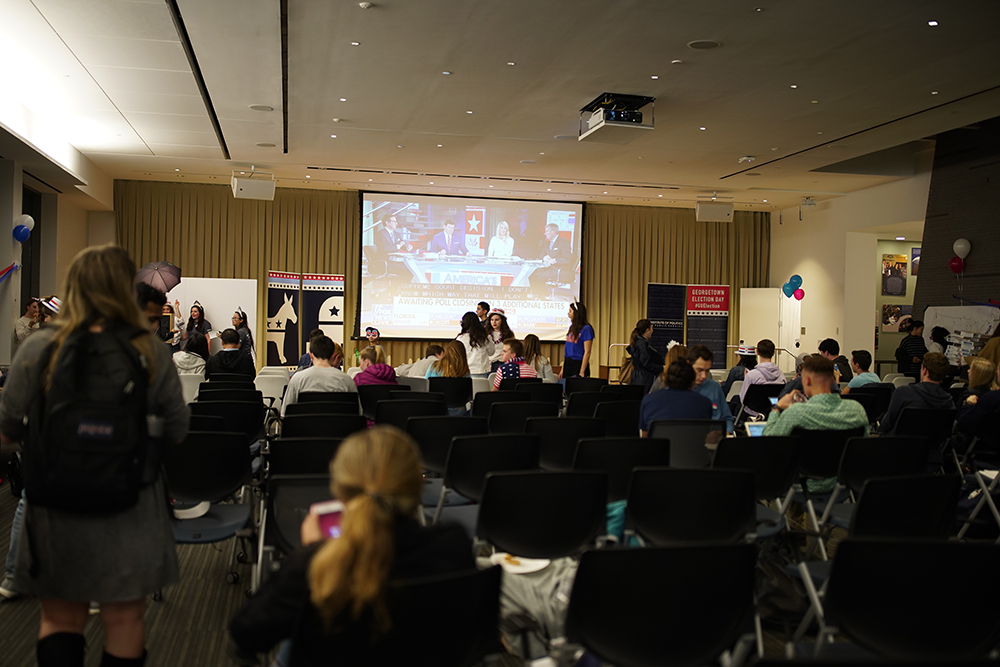
“I’m a little disappointed in Senate results so far, but I’m pleased with the house,” Alec Camhi (COL ’20), co-host of “Fly on the Wall,” a student-run podcast under GU Politics, wrote in a text.
The GU Politics election night watch party in the Healey Family Student Center’s Great Room in is made up of a predominantly Democratic crowd, with students cheering when races are called for Democrats outnumbering the relatively small numbers of Republicans in the crowd.
9:50 p.m.
“I’m still very scared,” GUCD Chair Maria Cornell (SFS ’20) said.
Cornell said that she is encouraged by the success of Florida’s Amendment Four — which restores voting rights to those previously convicted of felonies — and several Democratic pickups in the U.S. House, but that these were districts “everyone expected” to flip.
9:47 p.m.
Democrat Jennifer Wexton has defeated incumbent Rep. Barbara Comstock (R-Va.) by a 10 percent margin in the race for Virginia's 10th District, according to the Associated Press. #midtermscoverage
— The Hoya (@thehoya) November 7, 2018
9:43 p.m.
Sen. John Barrasso (R-Wyo.) (CAS ’74, GRD ’78) has won his re-election bid in Wyoming with 66.5 percent of the vote, according to The New York Times. #midtermscoverage
— The Hoya (@thehoya) November 7, 2018
9:43 p.m.
AJ Williamson (COL ’21), vice president of the Georgetown chapter of the ACLU, expressed disappointment about recent Senate election results.
“There have been some discouraging calls, especially in the Senate,” Williamson wrote in a text to The Hoya. “We’re pretty much in the same feeling we were for the House, and that has been reason for optimism in a couple of Governors races as well.”
9:38 p.m.
Rep. Francis Rooney (R-Fla.) (CAS ’75, LAW ’78) has won re-election in Florida’s 19th District with 62.3 percent of the vote, according to The New York Times. #midtermscoverage
— The Hoya (@thehoya) November 7, 2018
9:26 p.m.
Phil Mendelson (D) has been re-elected as D.C. Council chairman with 91.5 percent of the vote, according to The Washington Post. #midtermscoverage
— The Hoya (@thehoya) November 7, 2018
9:25 p.m.
Del. Eleanor Holmes Norton (D) has been re-elected as D.C.’s nonvoting delegate in the U.S. House with 87.8 percent of the vote, according to The Washington Post. #midtermscoverage
— The Hoya (@thehoya) November 7, 2018
9:20 p.m.
Sen. Tim Kaine (D-Va.) has been re-elected to the U.S. Senate, defeating Republican Corey Stewart (SFS ’91) with 54.6 percent of the vote, according to The Washington Post. #midtermcoverage
— The Hoya (@thehoya) November 7, 2018
9:20 p.m.
Kathleen Coen (COL ’22), who volunteered for a Republican congressman’s campaign over the summer, said she was “feeling pretty good” about the night so far.
“Frankly I thought that Democrats would be doing better,” Coen said.
9:07 p.m.
D.C. Mayor Muriel Bowser (D) has been re-elected with 79.6 percent of the vote, according to The Washington Post.
— The Hoya (@thehoya) November 7, 2018
9:05 p.m.
Maria Cornell (SFS ’20), chair of GUCD, said while the quick race calls in Virginia were encouraging, she was disappointed by many of the early results.
“That is not making me happy,” Cornell said in regard to early returns from Florida that showed Democrats trailing in the Senate and gubernatorial elections.
Cornell also saw room for growth in Democrats’ state party infrastructure, something she sees as crucial for the presidential campaign in 2020.
“We need to be investing in local parties,” Cornell said. “I’m sure it will be underscored tonight.”
8:51 p.m.
Martin Sweet of GU Politics said at this point in the night, Republicans are performing better than expected.
“So far we are seeing easy Dem wins – VA10 [Jennifer] Wexton, and FL26 [Donna] Shalala, but not on the heavier lifts. [Amy] McGrath goes down in KY6; Republicans holding on statewide in FL,” Sweet wrote in a text. “A surprisingly good night now for Republicans. But it is early.”
8:45 p.m.
While Alec Camhi (COL ’20), co-host of “Fly on the Wall,” a student-run podcast under the Georgetown Institute of Politics and Public Service, was optimistic Democrats would take the House, he described himself as “nervous” in light of numbers he said show a close race for control.
“I’m still nervous,” Camhi said. “I’ve been tracking the numbers pretty closely and it doesn’t look like quite as good of a night for Democrats as I had hoped, but we might still take the House. I still think at this point we have a chance there.”
8:28 p.m.
GUCR President Jake Lyons (COL ’20) said he believes Sen. Ted Cruz (R-Texas) will retain his seat for another term.
“Not many precincts have reported yet but I’ve felt since the start that Texas is a long shot for Beto,” Lyons wrote in a text. “Texas is a republican state and more than likely will remain that.”
8:15 p.m.
GUCR member Alex Mazzeo (COL ’22) is optimistic about the results for the Republican party.
“I’m super excited for this; the results are coming in, and they are starting to look good. I’m rooting for [Rick] Scott and his numbers are looking good in the Panhandle and his chances in general for Florida,” Mazzeo said. “In general, it’s looking great; it looks like the Republicans are going to pick up seats in the Senate.”
8:10 p.m.
Brendan Ferguson (SFS ’20) said while he wasn’t invested in the outcome of the election, he was interested in seeing the level of turnout among young voters.
“I’m really not sure which direction I think is best for the country,” Ferguson said. “I just hope the best candidates win.”
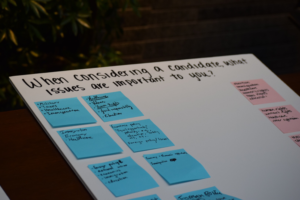
Charlotte Moore (COL ’19) said she would be watching the election tonight for Stacey Abrams’ bid for governor of Georgia.
“It’s super irrelevant to me because I’m not from Georgia, but I care a lot about the gubernatorial election in Georgia right now,” Moore said. “I think Stacey Abrams as the first women of color to be governor of Georgia would be incredible.”
Catherine Cral (COL ’19) said she wasn’t paying attention to the battle for the House but was watching to see if Rep. Beto O’Rourke (D-Texas) could beat Sen. Ted Cruz (R-Texas) in his bid to win a Senate seat in Texas.
“It’s pretty much the only one I’m looking at,” Cral said.
8:05 p.m.
Mo Elleithee, Fox News contributor, founding executive director of Georgetown’s Institute of Politics and Public Service, and former communications director and chief spokesman for the DNC FaceTimed Martin Sweet, director of the GU Politics Forum, on the projector in the HSFC at around 8:05 p.m. Elleithee said that the results so far point to a “miniature blue wave” but that it was still too close to count.
7:45 p.m.
Maria Cornell (SFS ’20), chair of GUCD, said the 2016 election weighs heavily on Democrats’ optimism for winning back the House.
“Having experience with the 2016 election is definitely one of the things that is informing a lot of peoples’ caution at this point,” Cornell said.
Yet despite the uncertainty, Cornell said the 2018 campaign has demonstrated the growing role of historically marginalized groups in the political process.
“We’ve seen this throughout the campaign season but just that a lot more people are engaged in these conversations,” Cornell said. “A lot more young people, a lot more women, a lot more people of color — a lot of people who represent demographics you don’t see in Congress at this point.”
7:35 p.m.
La Casa Latina resident Chelsea Hernandez (SFS ’20) said members of Congress should truly represent all Americans.
“Representation for communities that historically haven’t been represented is really important in these elections,” Hernandez said. “In order to make productive change, our representatives need to be representative of the American people and its changing demographics.”
7:15 p.m.
Quincey Wilson (COL ’20) said he was particularly looking at the gubernatorial election in Georgia. He described the potential for a victory by Stacey Abrams as “a historic moment.”
“In the 2016 election we saw not a lot of people voted,” Wilson said. “I think that we’re starting to be more aware that what we did in 2016 was a mistake.”
Nevertheless, Wilson said the results of the 2016 election have made him pessimistic about Democrats winning the House or the Senate.
Margo Snipe (COL ’20) said she was paying particular attention to her local races in New Jersey, as well as the gubernatorial races in Florida and Georgia.
“Florida is kind of a big deal; Georgia is a big deal in terms of race,” Snipe said.
7:08 p.m.
Joshua Marín-Mora (SFS ’21), a member of Georgetown University College Republicans and a native of Nevada, said he was optimistic about the results for Republicans due to the high rates of voter turnout.
“So I’m optimistic with respect to higher voter turnouts. I really think there’s going to be a significant increase in voter turnouts for both parties, that I’m optimistic for,” Marín-Mora said. “I’m optimistic for Republicans in general. I don’t think we’re going to lose as bad; I don’t believe so at least. If anything, I believe we’ll keep the Senate, keep the governor’s mansion [in Nevada].”
7:05 p.m.
Michael Lundgren (SFS ’22) and Maggie Fouberg (SFS ’22) both said they were paying particular attention to their races back home, in California and South Dakota, respectively.
“This is one of the experiences I’ve been most looking forward to at Georgetown,” Lundgren said.
6:07 p.m.
Lauren Zelt (COL ’09), the managing director at FP1 Strategies, a marketing company for political campaigns, and a member of the leadership network at the American Enterprise Institute, was one of two alumni panelists at the event, “What to Watch for in the Midterm Elections.” Zelt emphasized the impact that Democrats winning the Senate would have on altering the political makeup of the country.
“If the Democrats take the House, which I think is likely, then I think that’s the story,” Zelt said. “If they take the Senate, then it’s the tsunami.”
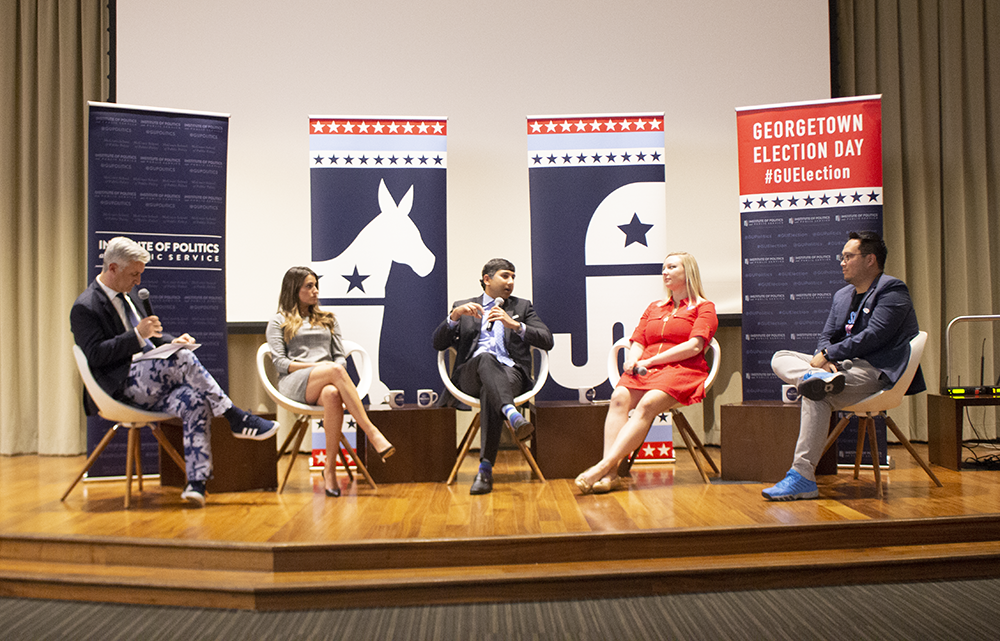
6 p.m.
At the “What to Watch for in the Midterm Elections” panel in the Healey Family Student Center, Roshan Patel, executive director of the Democratic Lieutenant Governors Association, explained that for members of a political campaign, there is little to do on the day of an election.
“It’s a lot of sitting and waiting,” Patel said. “You’ve deployed the plan, you’ve raised the money, you’ve got folks out there doing what they need to be doing and you’re kind of in the war room, which I’m sure we’ve all been in, and you’re just hitting refresh on your computer.”
5:26 p.m.
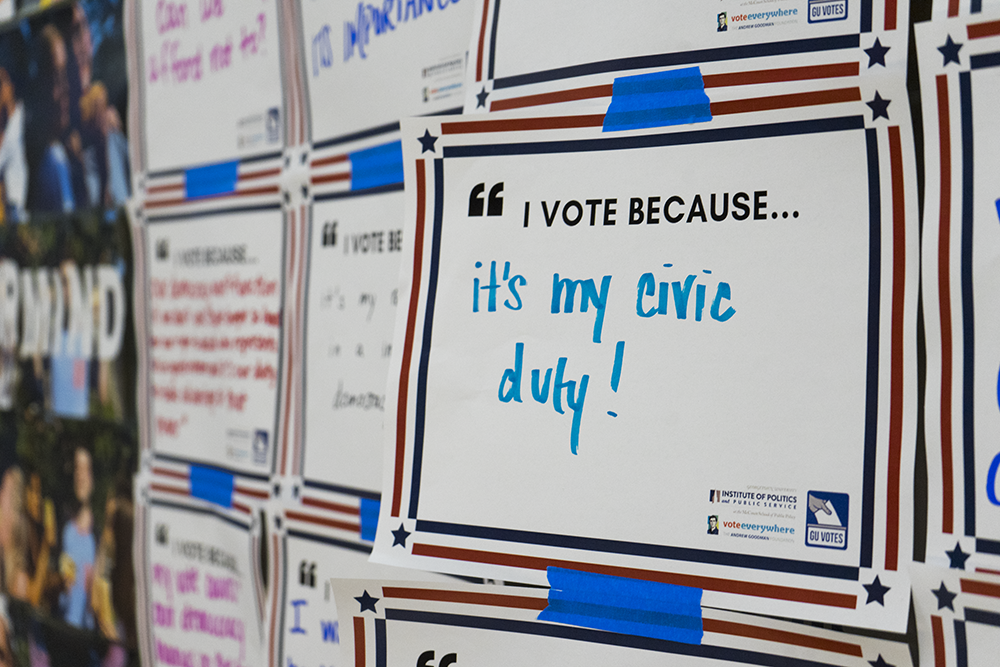
Reflecting on attitudes toward activism following the 2016 election, La Casa Latina Resident Director Joseph Gomez (SFS ’19) wrote in an email to The Hoya that community organizing and voting bring about real change.
“We get actual change through local and community organizing,” Gomez wrote. “I remember seeing signs at the Women’s March that said ‘If she won we would be at brunch right now,’ and another viral twitter post encouraging people to vote in this election with the tagline ‘Voting is easier than marching.’ To me, these attitudes toward politics really show how the construction of our democracy distances the electorate from issues that affect marginalized communities.”
However, Gomez wrote that he is happy to see young Americans being active in all sides of the democratic process.
“It has been refreshing to see so much engagement and activism around voting from members of my generation, and I hope that when we all wake up on November 7 that win or lose we are ready to stand in solidarity with each other and continue to fight for the country we deserve,” Gomez wrote.
5:23 p.m.
As voting enters its final few hours, here’s how Hoyas have been participating this Election Day.
3:07 p.m.
Maria Cornell (SFS ’20), chair of Georgetown University College Democrats, said she thinks people can easily forget that some populations have easier voting access than others and said she hopes people who can easily vote advocate for others’ voting rights, at the event “Combating Voter Suppression in the 21st Century.”
“I think a lot of people can become kind of unappreciative of their access to voting power and how that does really give them a leg up in the government systems and what happens across the country,” Cornell said.
3:05 p.m.
Kai Isaia (COL ’22) said at the “Combating Voter Suppression in the 21st Century” event that she is glad to have had the opportunity to talk to students who have witnessed voter suppression.
“It was really nice being in this space talking to different people from different states who have had different experiences like witnessing voter suppression,” Isaia said. “And it’s really good knowing that Georgetown is actually working to kind of attack voter suppression in different ways, but also [students] are here for one another in their experience of that.”
2:05 p.m.
Georgetown students, such as Coly Schmidt (NHS ’22), express how elections are different on the Hilltop: “When everyone else around you knows what’s going on, you have to know what’s going on.” pic.twitter.com/A0kLlpUyK5
— The Hoya (@thehoya) November 6, 2018
1:37 p.m.
Gilbert Saldana (COL ’19), president of the Georgetown Bipartisan Coalition, said students should remember not to assume the winner before the results are in.
“Personally, I am stoked to watch the results come in. Election day is always exciting, and being on such a politically conscious campus takes it a notch further,” Saldana said. “While there have been a lot of predictions, one must always remember it’s not over until it’s over, as we saw in the 2016 presidential election.”
1:24 p.m.
Rebecca Hollister (COL ’21), director of campaigning and off-campus affairs for GUCD, said though she will not be making any predictions, the large proportion of people who voted early across the country make her optimistic for the results. This year, 36 million people voted early nationwide, up from 27.2 million early voters in the 2014 midterm election, according to Politico.
“It is definitely an emotional time given that a lot of us were optimistic about 2016 and that did not turn out well on a national scale,” Hollister wrote in a text. “However, early voting numbers are so high that it’s almost impossible not to be excited. I’m cautiously optimistic — we’re getting great responses from voters regarding line lengths, and regarding statistics of Dems getting out to vote. But I’m trying to be realistic and not predict anything.”
1:23 p.m.
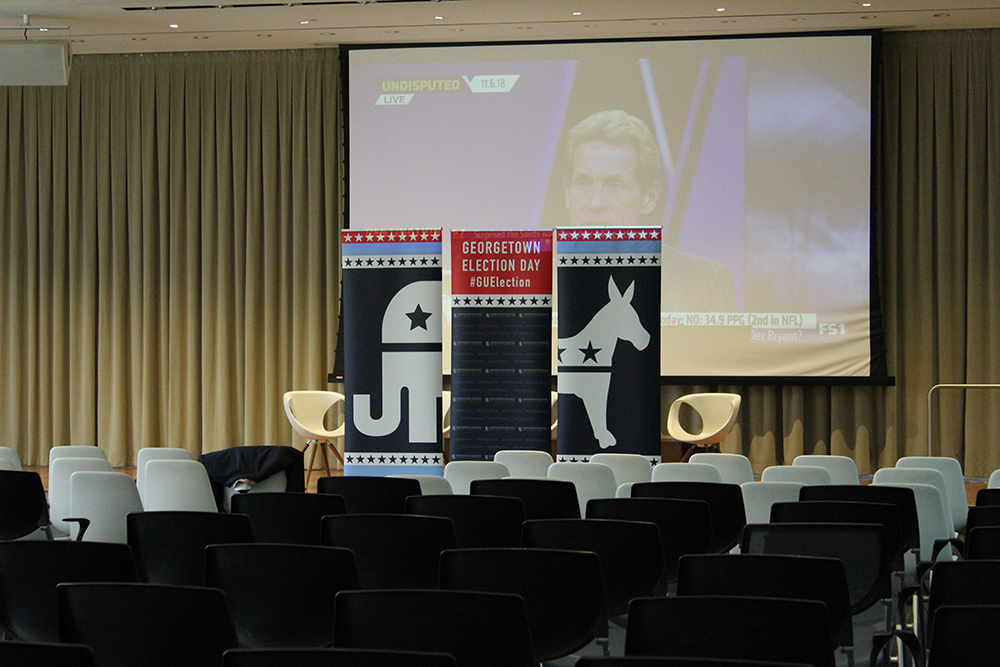
Students gathered in the Healey Family Student Center to watch campaign ads, predict race results with the GUPolitics and Politico 2018 midterm election challenge paper ballot, and eat Chipotle at the “Gerrymandering and Chipotle” event. AJ Williamson (COL ’21), vice president of Georgetown’s ACLU chapter, said he is hopeful for the results of today’s election.
“I’d say I’m feeling cautiously optimistic; we’re optimistic that candidates who share our priorities on the issues we’ve been advocating for will be elected up and down the ballot and across the country,” Williamson said at the event.
1:08 p.m.
Diego De La Torre (SFS ’21), policy chair for the Georgetown Bipartisan Coalition, emphasized the importance of the increasing number of young voters hitting the polls at the “Donuts and Discourse” event.
“Going into the midterm elections, I think the most exciting thing is the energy around campus and the entire United States. People are fired up and motivated, and whatever the reason may be, the fact is that people are going out in mass to vote, which I think is unprecedented in my state, Texas, where we have a 500 percent increase in the number of young voters who have turned out to vote, which is insane,” De La Torre said. “In terms of nationwide, what I really want to see is that people realizing that their voice matters and that they have a stake in these elections. It doesn’t matter who they vote for; your vote matters, and you can actually shape policy by voting.”
1:07 p.m.
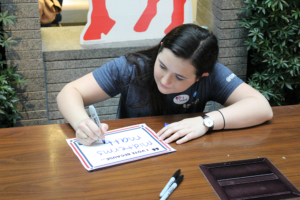
Jacqueline Beveridge (SFS ’19), co-president of GU Votes, a GU Politics voter registration initiative, highlighted the program’s role in assisting voter registration, with more than 450 individuals using the dropbox system to acquire absentee ballots.
“I’m just happy that GU Votes was able to help people register to vote and request their absentee ballots– over 450 people used our voter dropbox system to request absentee ballots,” Beveridge wrote in a text. “Voting is difficult and confusing, so I’m glad that we got to make voting a bit easier for people in the Georgetown community!”
1:05 p.m.
Lucy Chatfield (COL ’22), member of the Georgetown chapter of the American Civil Liberties Union, and Taylor Kahn-Perry (COL ’22) echoed other students’ sentiments and said they were nervous about the results.
“[I’m] definitely really nervous, but I had a big moment of excitement and optimism last night, which is kind of carrying into today,” Chatfield said. “The Democrats taking back the House is mostly what I’m optimistic about.”
“I’m more nervous than excited, definitely very, very nervous,” Kahn-Perry said. “But I’ve seen more people excited to vote than I ever have. People that I never thought would have voted are registering other people to vote and posting on social media.”
12 p.m.
Alec Camhi (COL ’20), co-host of “Fly on the Wall,” a student-run podcast under the Georgetown Institute of Politics and Public Service, is cautiously optimistic about tonight’s results.
“I’m optimistic but nervous. I think it will be a good night for Democrats, and it seems like there’s so much more energy on the Democrats’ side right now,” Camhi said. “But I also felt good going into election night two years ago, so I don’t want to get my hopes up too high until results come in tonight.”
11:27 a.m.
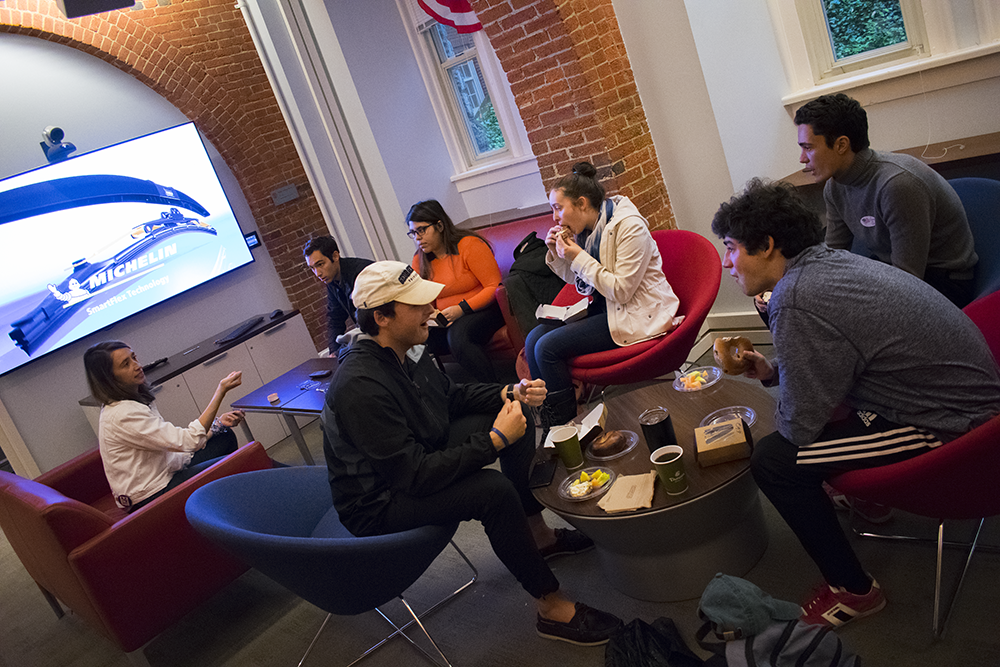
Dozens of students convened in the Baker Living Room Tuesday morning for the Georgetown Institute of Politics and Public Service’s bipartisan breakfast, co-sponsored by the Georgetown University College Democrats and Georgetown University College Republicans, to kick off election day 2018. “I’m feeling cautiously optimistic,” Maddy Duval (COL ’22), a member of GUCD, said at the breakfast. Justin Kasian (McCourt ’20), a Republican, is nervous about the results, he said. “I am definitely nervous about it, but as we saw from the last election, things are so volatile now and the polls are so all over the place, so I don’t know what to think,” he said in regard to the outcome of the House of Representatives.
11:11 a.m.
Seven of the 13 seats on the Washington, D.C. Council are up for election Nov. 6, as eligible voters will head to the polls in elections for the chairman of the Council; the seats representing Wards 1, 3, 5 and 6; and two at-large seats. https://t.co/lx4uAGriNx
— The Hoya (@thehoya) November 6, 2018
11:05 a.m.
Jake Lyons (COL ’20), the president of GUCR, is looking forward to the events of the day. “Talked to a good amount of members today at our bipartisan breakfast with College Dems … overall, members confident in keeping the Senate,” he said. “The House looks in favor of Dems, but pretty confident that more Republican seats will be retained than people are expecting. All in all, Republicans in my club seem pretty relaxed and looking forward to a day of democracy at work!”
10:30 a.m.
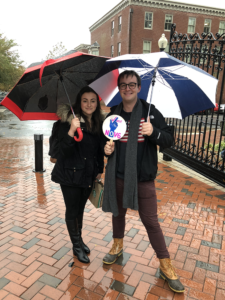
Mara Goldman (SFS ’19) and Zac Schroepfer (MSB ’19), members of the Advisory Neighborhood Commission, walked to the polls as part of the Georgetown Institute of Politics and Public Service’s Election Day activities, in partnership with GU Votes
8:30 a.m.
“Today could either go either really badly or really well,” said Colby Schmidt (NHS ’22), a member of GUCD. “I have a lot of hope in my heart, but I’m also not trying to get my hopes too high, because I don’t want to get too disappointed.”
Schmidt, who hails from Texas, said she was paying particular attention to the Senate race between Rep. Beto O’Rourke (D-Texas) and Sen. Ted Cruz (R-Texas). While she is rooting for O’Rourke, she “doesn’t think it’s going to happen.”
One Republican said while it was likely the House would flip to Democrats, the 2016 election taught him to be prepared for any outcome. “I’ve learned to be a lot less confident in my views,” Kasian said.
Several students spoke to Georgetown’s role in magnifying the 2018 midterm election.
“When everyone else around you knows what’s going on, you have to know what’s going on,” Schmidt said.
The atmosphere of Election Day at Georgetown was a stark contrast to what he found in his home state of Georgia, Kasian said.
“The difference from here and obviously Georgia is it’s much more apathetic for politics,” Kasian said. “So it’s really nice because here, regardless of how people feel, they’re so much more ambitious about what they care about.”
Arthur Calcagnini (MSB ’19) said he was excited to see the impact of millennial voters, echoing the point of James Patrick Loughran (COL ’20).
“Hopefully seeing more people come out and vote, especially among our age to have us represented, would be great and to see movement due to that,” Loughran said.
“I really hope even if the Democrats lose the Senate that they’ll win Texas,” said Elliot Mack (SFS ’22), who self-identified as a Democrat. “I think it would be devastating if we lost both [chambers].”
“I’m cautiously optimistic,” Mack said.
Natalia Lopez (COL ’22) said while she was not really hoping for a certain winner of the night, she was nonetheless very engaged in the midterm elections.
“I don’t know if it’s because everyone here is so politically inclined, but I’m definitely paying a lot more attention to the races and how close it is,” said Lopez, who described herself as a moderate. “I’m excited — I want to see how things turn out.”
